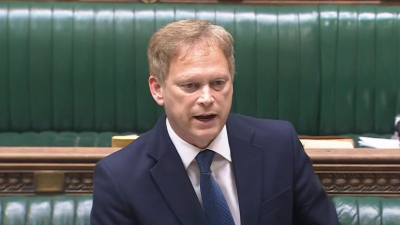Unveiling Israel's Ambitious Shift: Challenging the Two-State Solution and Its Global Implications
In a bold move with potential far-reaching consequences, Israel, post-7 October, is suspected of pursuing a strategy to integrate Gaza into an expanded Israeli state. This revelation, articulated by Israel's ambassador to the UK, marks a stark departure from previous diplomatic stances, asserting that there will be no Palestinian state and casting doubt on the prospect of a two-state solution.
The significance of this declaration reverberates globally, placing the UK and the US in a precarious position. For decades, the West, particularly the US and the UK, has advocated for a two-state solution as the key to achieving lasting peace in the region. Despite the historical challenges and entrenched positions, the Oslo Accords in the 1990s represented a diplomatic milestone, with the recognition of Israel by the PLO and reciprocal acknowledgment of the PLO as the representative of the Palestinian people.
The proposed two-state solution envisioned Palestinian rule over the West Bank and Gaza, with the remaining territory constituting the Israeli state. While a definitive agreement was elusive, the idea gained traction over the years. Even in 2017, Hamas suggested it could serve as a foundation for negotiations.
Now, Israel's explicit rejection of the two-state option raises questions about its evolving military strategy in Gaza. The international community closely watches as geopolitical dynamics shift, redefining the parameters for peace in a region historically marked by conflict and contention.
Unraveling Israel's Military Strategy: Potential Shifts and Global Implications
The intersection of military strategy and political objectives becomes evident in the context of Israel's stance on a two-state solution. Traditionally, if a two-state solution were the political goal, military campaigns would target groups like Hamas while preserving Gaza's infrastructure and minimizing civilian casualties. However, recent indications suggest a departure from this approach.
Israel's rejection of the two-state solution raises questions about their broader political ambitions. If the objective leans towards an expanded state, the military strategy may involve clearing Gaza, impacting infrastructure, creating a humanitarian crisis, and potentially displacing Palestinian residents. Contrary to previous diplomatic statements, it's apparent that Israel's aims extend beyond addressing the immediate challenge posed by Hamas.
Implementing a military campaign aligned with expanded ambitions in Gaza would likely be a prolonged effort with significant consequences for Palestinian residents and the deepening humanitarian crisis. This not only underscores the complexity of the situation but also places the US (and UK) in a challenging position. The recent US veto of a UN Security Council resolution for a ceasefire signals a stance favoring Israel's actions, potentially complicating the alignment of Western countries with principles of self-determination, as criticized in other geopolitical contexts.
The comparison with Russia's invasion of Ukraine raises crucial questions about the consistency of international stances. If Israel pursues a strategy reminiscent of Russia's actions, the US and UK may face challenges justifying their support, given their emphasis on principles like self-determination in other global conflicts. As events unfold, the international community will grapple with navigating these complex dynamics and maintaining a cohesive approach to conflicts in different regions.
Unveiling Israel's Ambiguous Strategy: International Ramifications and Diplomatic Complexities
Amidst diplomatic assurances to the contrary, the revelation that Israel's post-7 October strategy may involve integrating Gaza into an expanded Israeli state carries profound international implications. Despite Israel's historical assertions that it does not seek to occupy Gaza after conflicts, this potential shift could disrupt diplomatic relations, particularly with the Arab world, and reshape the geopolitical landscape.
If this strategy unfolds as speculated, it not only challenges established diplomatic narratives but also signals a departure from conventional approaches to conflict resolution in the region. The significance of this announcement reverberates across the global stage, prompting questions about the nature of Israel's ambitions and the subsequent fallout in international relations.
The potential subsuming of Gaza into an expanded Israeli state poses a complex geopolitical puzzle, with ripple effects extending beyond the immediate conflict. As the international community grapples with the evolving dynamics, the US and UK find themselves entangled in the diplomatic complexities arising from this strategic shift.
In essence, this revelation stands as more than a mere development in the ongoing conflict; it represents a seismic shift with far-reaching consequences that could redefine diplomatic alliances, reshape regional dynamics, and challenge established norms in the pursuit of lasting peace in the Middle East.
In Conclusion: Navigating Uncharted Diplomatic Waters Amidst Israel's Strategic Shift
The disclosure of Israel's potential strategy to subsume Gaza into an expanded Israeli state, despite diplomatic reassurances to the contrary, marks a momentous development with far-reaching international consequences. This revelation challenges established narratives and geopolitical norms, raising profound questions about the nature of Israel's ambitions and the subsequent impact on diplomatic relations, particularly with the Arab world.
The significance of this announcement extends beyond the immediate conflict, creating a complex geopolitical puzzle that demands careful consideration. If this strategic shift materializes, it not only alters the landscape of conflict resolution in the region but also places the US and UK in the midst of intricate diplomatic complexities.
As the international community grapples with these evolving dynamics, the potential subsuming of Gaza becomes more than a military strategy; it emerges as a seismic shift with broad implications. This shift has the power to redefine diplomatic alliances, reshape regional dynamics, and challenge established norms in the pursuit of lasting peace in the Middle East. Navigating these uncharted diplomatic waters will require careful deliberation and a nuanced approach to address the complexities that arise from this significant and potentially transformative revelation.







